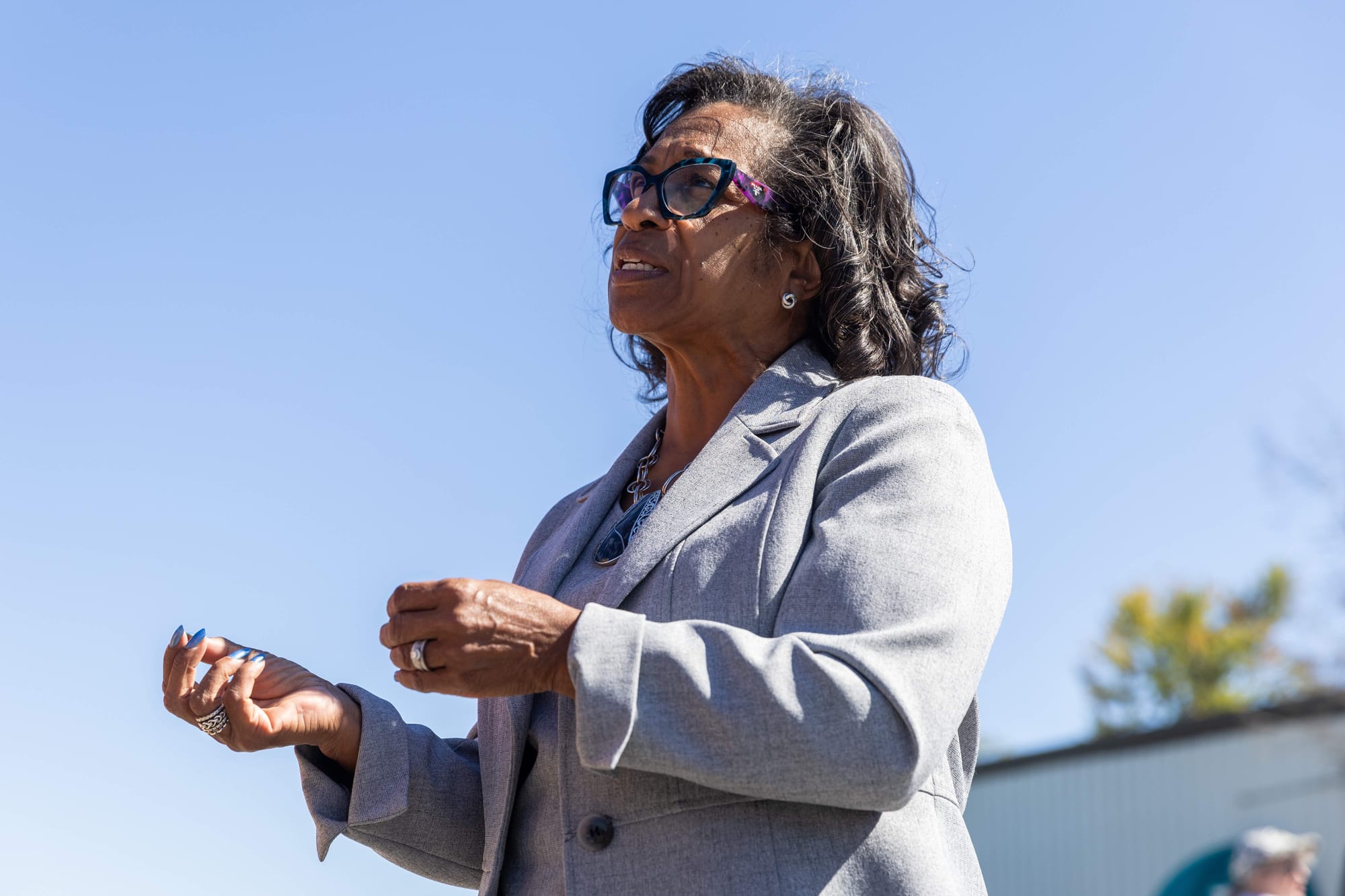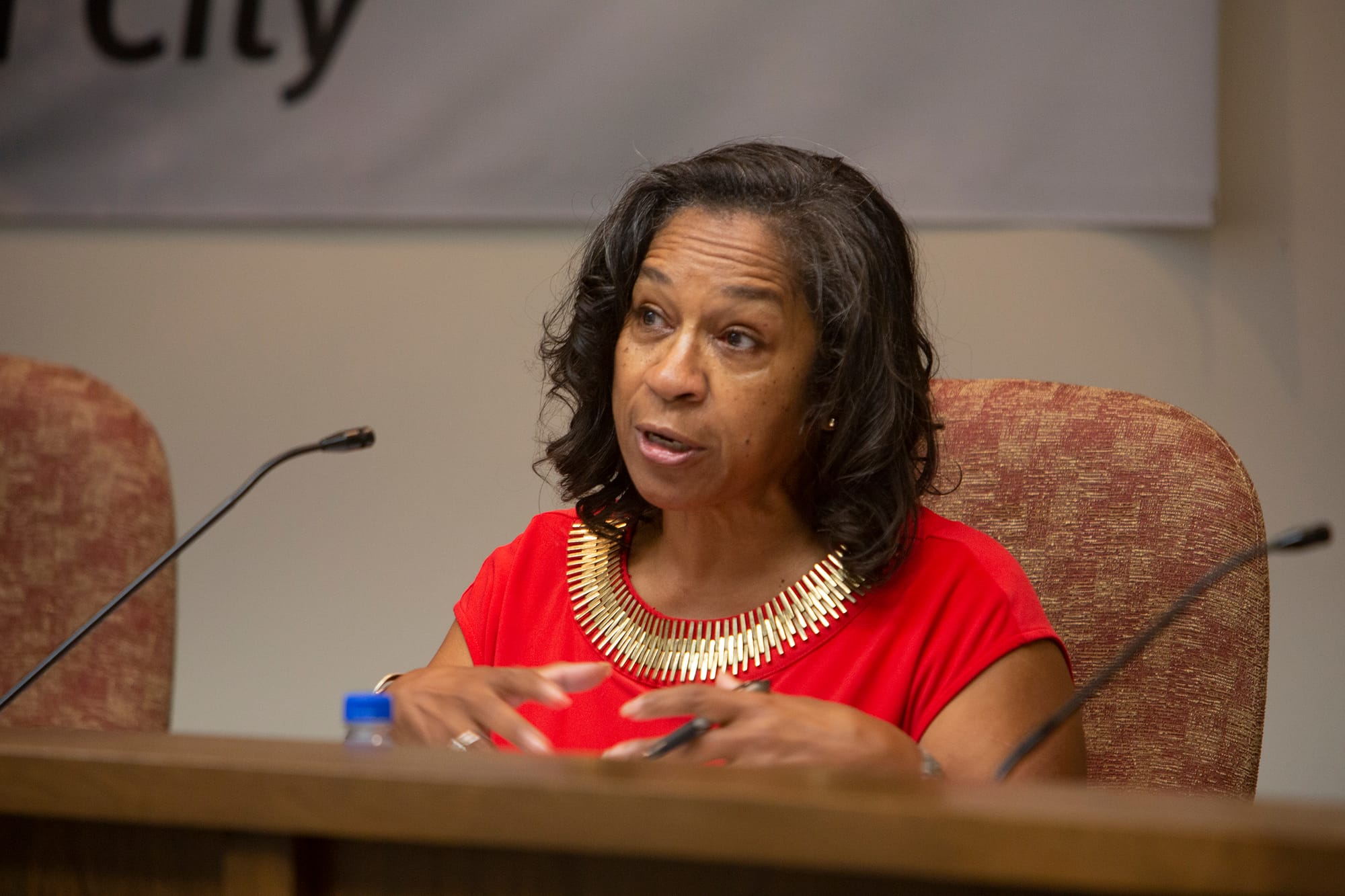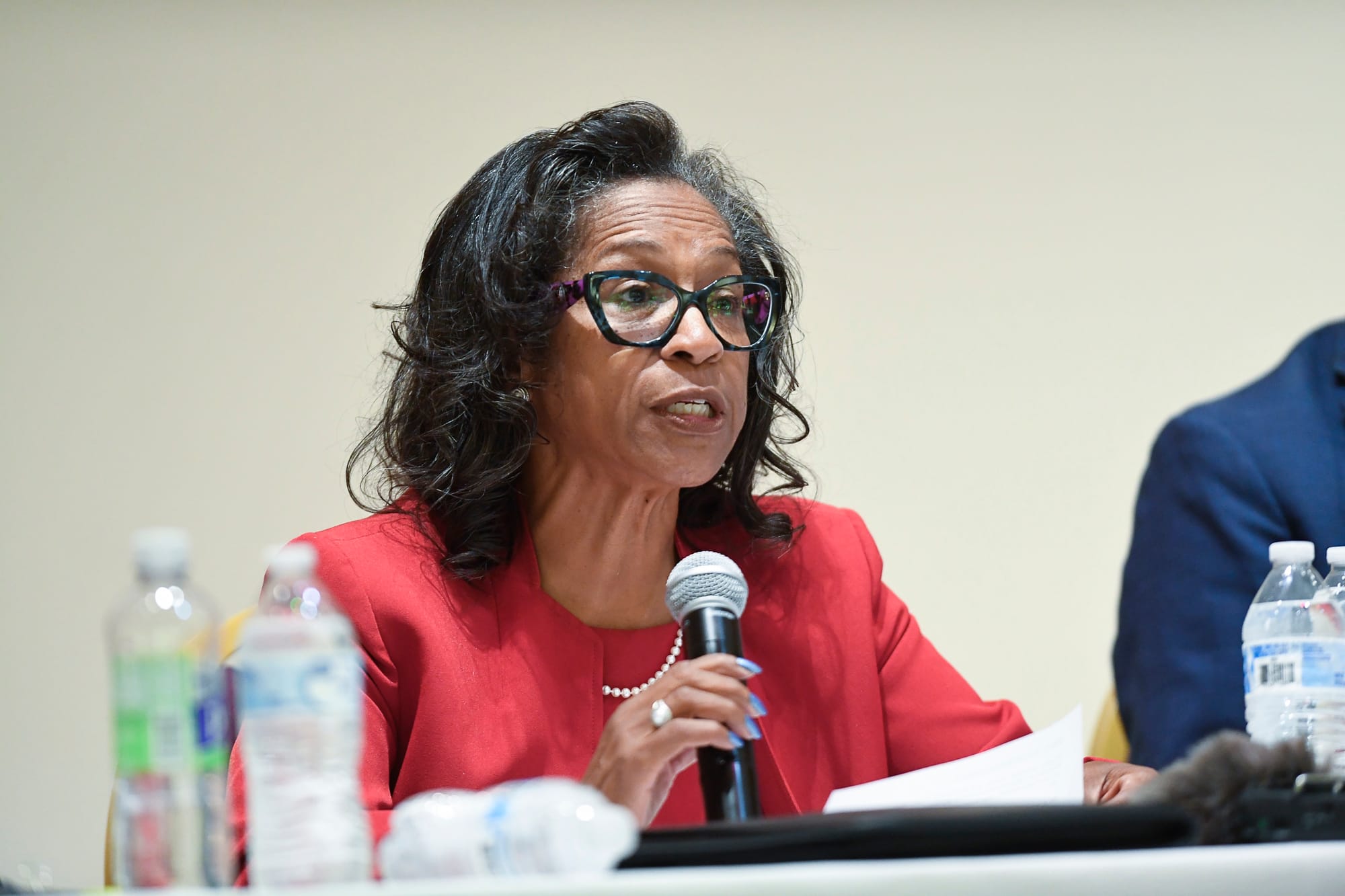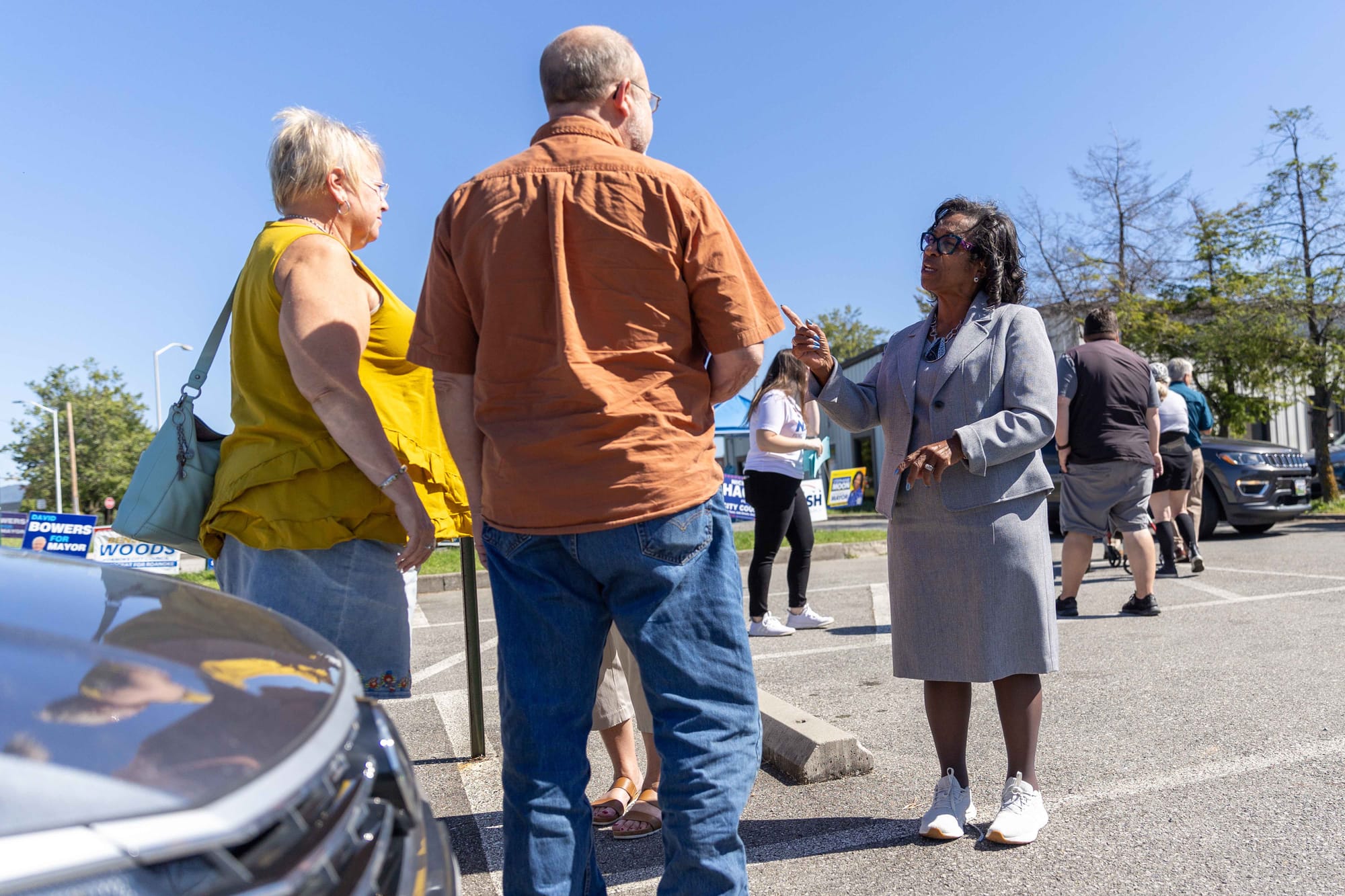An Independent Streak Since Childhood, Stephanie Moon Reynolds Seeks Mayoral History
Moon Reynolds, a longtime city clerk who is finishing her first term on Council, is trying to notch a historic doubleheader.

Stephanie Moon Reynolds quickly rose from a folding chair and strode briskly across the pavement to talk to three women heading to vote.
“I’ve seen your beautiful face on the signs everywhere!” one of the women exclaimed, as she was buttonholed by Moon Reynolds on her way to cast an early ballot at the Roanoke registrar's office.
Moon Reynolds, casually dressed in rolled-up jeans and a bright yellow T-shirt emblazoned with a logo that read “Moon for Mayor,” her head topped with a blue ball cap bearing the words, “It Only Takes One,” made her pitch.
“I hope I can count on your vote,” Moon Reynolds said to the woman.
The lady leaned in and said in a stage whisper, “You can, but don’t tell anybody.” She also offered to drive Moon Reynolds’ supporters to the polls, if needed.
“You have to sell yourself,” Moon Reynolds said. “When you’re an independent, you’re really freelancing. It’s like self-employment. If I’m not out here doing this, nobody else will.”
Moon Reynolds, 66, a longtime city clerk who is finishing her first term on Roanoke City Council, is trying to notch a historic doubleheader by becoming Roanoke’s first woman mayor, and the first Black woman mayor, at that. Running as an independent against party-affiliated candidates — Democratic Vice Mayor Joe Cobb and former mayor David Bowers, a former Democrat-turned-independent who’s now a Republican — Moon Reynolds, a mother of three adult children, a grandmother and a great-grandmother, is leading a largely self-funded and self-reliant campaign that has drawn support from a swath of business, political and church leaders who believe that the city needs a different direction.
“She has a diverse bloc of people who support her,” said Bill Lee, a retired minister who endorsed Moon Reynolds during her candidacy announcement in March, “especially those who recognize she sat in city hall in the clerk’s office for a long time. She’s somebody who understands how this city runs from an administrative standpoint. She is somebody who knows the ins and outs of how to get things done.”
Moon Reynolds, who won a Council seat in 2020 after losing a contested Democratic primary that took place online just as the pandemic shut down public gatherings, has been fiercely independent on Council. She has butted heads with fellow members, including Democratic Mayor Sherman Lea, on a range of issues that include city spending and the passage of controversial zoning revisions. But she has also found herself occasionally aligned with Lea, a two-term mayor not running for re-election, on issues such as their criticism of the city’s Gun Violence Prevention Commission, a panel once chaired by Cobb which was formed to find ways to reduce gun-related crimes.
Some local political leaders believe that Moon Reynolds’s mayoral campaign could act as a spoiler that prevents one of the party-aligned candidates from winning. That feeling is most prevalent among city Democrats, some of whom worry that Moon Reynolds could siphon away Black voters, a key voting bloc for Democrats, which could open the door for Bowers to become the first Republican to win a city mayor’s race since Ralph Smith in 2000.
Not coincidentally, the 2000 election was also a three-candidate race in which Smith was able to win with just 35 percent of the vote over Bowers, then a Democrat, and independent Mac McCadden. Now, after more than two decades without a single Republican on City Council, some Democrats worry that Moon Reynolds is creating a path for Republican victory.
“That is a big concern,” said Lea, the second Black mayor in Roanoke history. He supports fellow Democrat Cobb.
“I think that Stephanie and Joe could really open the door for David,” Lea said. “Even though Stephanie is an independent, she could pull a lot of African-American support in Roanoke. She has friends across the city. … I am out there supporting Joe Cobb, and Democrats have to get their supporters to the polls.”
Moon Reynolds, however, has no interest in playing a spoiler. She believes that her campaign will win the support of not only Democrats, but also Republican voters looking for an alternative to Bowers, who spent most of his political life as a Democrat before becoming an independent and then, just two years ago, a Republican.
“Roanoke has lacked vision for some time,” she said. “I think I can win. I feel very optimistic.”
'I'm still the loner'
As the lone independent among six other Democrats on Council, Moon Reynolds said she often feels that decisions are made by others even before issues come to a full Council vote.
“The Council talks among themselves, two [members], maybe three, and then next thing you know, it's on the table, on the dais, and you're trying to figure out where we are going with this,” she said.
Other Council members don’t respect her experience, she said.
“With 42 years in the [clerk’s] office of the Council, I know how that office should run,” she said. “I know procedures. I know processes, and you don't want to give me the respect. Even when you are collaborating on things, you don't talk to me. They still don't, really. I'm still the loner, right?”
One of the biggest disagreements she had with other members came during city budget discussions in 2022, when she disapproved of a proposed $2,500 travel stipend for Lea, a proposal she believed Council had not fully discussed. Her motion for the stipend to be removed was not seconded by another member, which prompted a bitter exchange between Moon Reynolds and the mayor. Moon Reynolds walked out of the meeting, then returned to cast the lone “nay” vote against a proposal that included the stipend.
Shortly after that meeting, she decided she wanted to run for mayor, she said, even before Lea announced that he would not seek a third term.
Moon Reynolds cast the only “no” vote against a recent zoning ordinance change that allows for more home density and multifamily housing, a decision that sparked controversy and a lawsuit from a group of Roanoke residents. She acknowledged that affordable homes are hard to find in some neighborhoods, but said she would rather see city leaders fix up derelict houses and crack down on absentee property owners rather than make zoning changes.

'You'll be mayor next'
Moon Reynolds’ independent streak comes as no surprise to those who know her and who have worked with her. She has been self-reliant since her childhood days, especially during her teen years spent in a Roanoke public housing complex raised by a frequently absent mother, a time when she learned to fend for herself and her three siblings.
“She has always been the one who had to make things happen,” said Earl Reynolds, Moon Reynolds’ husband, who has been married to her for a decade. A former longtime Roanoke assistant city manager and current deputy assistant manager in Danville, Reynolds said that his wife’s community roots make her a viable candidate.
“She knows everybody,” Reynolds said.
A Roanoke native, Moon Reynolds spent her early years in Roanoke’s West End, where she attended Hurt Park Elementary School. Her parents divorced when she was nine years old, and over the next four years, Moon Reynolds shuttled between her grandmother’s house in McDowell County, West Virginia, during the school year and back to Roanoke during summers. When she was 14, she returned to Roanoke for good, living in Hunt Manor on Hunt Avenue in Northwest Roanoke.
Her mother, who was a teenager when Moon Reynolds was born, often left her oldest daughter to take care of the other children, which included a sister and two brothers.
“I came back home to Hunt Avenue and I started … pretty much being the mother of the family,” she said. “You see, my mother really was still a child herself. We were on public assistance for a while. I hated that. I felt embarrassed. It was bad enough living in public housing.”
She said the family often subsisted on the federal government’s supplemental food programs, which often supplied only the most basic nutritional needs in the form of powdered milk, powdered eggs and other food.
“One time, it came down to a dozen brown and serve rolls and a cucumber,” Moon Reynolds said. “I asked my sister, ‘Which one do you want?’ She took the cucumber. I took the brown and serve rolls.”
She attended James Monroe Junior High School and later William Fleming High School. She made good grades, excelled in business classes where she said she was often the only Black student in class. Even then, she perceived a lack of respect from her peers, a feeling that would motivate her through the years.
“I never felt like I was being treated different, except when it came to socializing,” she said. “That's when I felt like I was not being treated right. Because they already had the two-parent families. They had a house. I'm in public housing. … I didn't really have friends. I got shunned at school because most of your friends … didn't have much to do with you because you had second-hand clothes.”
She was fueled by a strong desire to show people she could rise above her circumstances and persevere, according to people who knew her during her teen-age years.
“She always felt like, ‘I’ve got to do that extra everything to prove myself to people that I am worthy,’” said Trequita Trials, who has known Moon Reynolds since they were both 14 years old.
“She always felt like she had to do better than others.”
Moon Reynolds became pregnant during her senior year, yet still graduated from Fleming in 1976 with honors. She called teen pregnancy “the generational curse” in her family, having been raised by a teen mother herself. She said that her teachers worried that she would end up on a similar path: no college, no good job, a life spent on public assistance.
“They knew the statistics” about the likely poor outcomes for teen parents, she said.
She and her first husband had three children together, then divorced after about a decade of marriage, leaving her in a similar situation that she herself had been in as a child.
“I assured [the children] that what happened to me was not going to happen to them,” she said.
She had already joined the city clerk’s office in 1978 at the age of 20 by taking an entry-level position under the esteemed clerk Mary Parker, who served as city clerk for 30 years. One of the first things that Moon Reynolds, then Stephanie Wood, noticed was how professionally elegant Parker dressed for her job.
“I didn't know who she was, but I just thought she was a well-put-together person,” Moon Reynolds said. “My mother dressed [neatly] and my father dressed. My mom, she would wear stiletto heels and dresses to match, and my grandmother was the same. I always knew when I grew up I needed a job where I dressed up.”
Moon Reynolds worked her way up through the department, took a brief sojourn to Parks and Recreation, then returned to the clerk’s office. She took classes at Virginia Western Community College, graduating cum laude with an associate’s degree in legal services.
In 2006, after Parker retired, Moon Reynolds was named acting clerk before getting the job on a permanent basis in 2007, a position she held until she retired in 2019.
She was Roanoke’s first African-American city clerk, and the first in Southwest Virginia. In 2020, she was elected to City Council.
“When she got on Council, we said, ‘You’ll be mayor next,’” Trials said. “She said, ‘I think I will. If the Lord tells me to do that, I’m going to do that.’ So, we started calling her ‘mayor.’”

'I did nothing unethical'
Sometimes, Moon Reynolds’ brash independence rankles colleagues or, as on one occasion, gets her in hot water.
In 2014, Moon Reynolds acknowledged that she overstepped her duties as city clerk when she actively advocated that Council not approve a measure that allowed alcohol sales for special events in Preston Park, near her neighborhood. She signed a petition against the measure, which was submitted to Council, an act that prompted some members to question her impartiality. Moon Reynolds, a devout Christian who does not drink alcohol, said that she was acting as a private citizen when she signed the petition and lobbied other residents to oppose the new rules. The measure was approved 4-3 and Council took no public action against Moon Reynolds, who five years earlier was named Clerk of the Year by the Virginia Municipal Clerks Association.
“I did nothing unethical,” Moon Reynolds said. “Somebody wrote an anonymous letter to the executive director [of the Virginia Municipal Clerks Association] to have me sanctioned, but nothing ever came of that.”
Lea, who had received emailed talking points against the alcohol measure from Moon Reynolds when he was on Council, said that members aired their concerns about her public opposition to Council’s vote, but moved on.
After retirement, she sought to run for Council as a Democrat, but just before a scheduled firehouse primary was to take place in May 2020, the Covid-19 pandemic prompted stay-at-home orders from Gov. Ralph Northam. After consulting with state election officials, the local Democratic committee opted for a virtual primary that allowed only the 77 committee members to choose three candidates from five nominees.
Moon Reynolds finished last with 22 votes. Unhappy that the primary was not open to more voters, she left the party and ran as an independent candidate, winning one of the three open seats by finishing third with 14 percent of the vote.
Her independent run irritated local Democrats, who said that Moon Reynolds had pledged to support the Democratic slate before she lost in the primary, according to then-Democratic chair Beth Deel.
Deel said that Virginia’s recently strengthened “sore loser law” that prevents candidates from running in a general election after losing a primary likely would have kept Moon Reynolds from running as an independent.
“She did exactly what she said that she wouldn’t do,” Deel said. “This is how her political career started.”
Moon Reynolds said that she left the Democrats because she objected to the process that allowed only committee members to vote in the virtual primary.
“That's when I decided, ‘You cannot be the one to determine who should be on Council, this is not democracy,” she said. “So, I resigned.”

'I've never changed'
With at least three new members coming to Council following the election, and with Roanoke searching to replace former city manager Bob Cowell, who resigned in June, Moon Reynolds said that her years of experience in city government will be needed in the mayor’s chair.
“On day one as mayor, I want to bring the Council and the administration together and collaborate on all fronts,” Moon Reynolds said. “I want to be the person who builds bridges, who brings people together to meet and talk and move this city forward. I want to hear what the priorities are and find ways to make those things happen.”
Running as an independent and lacking a political party’s fundraising machine, Moon Reynolds has spent $21,085 of her own money, either through direct contributions or loans, to financially support her campaign through Aug. 31, according to the most recent figures from the Virginia Public Access Project.
She trailed Cobb’s fundraising haul, $46,801 to $39,188, but she basically matched Cobb in number of small donors (those contributing $100 or less), which can be a measure of grassroots support, securing 106 donors to Cobb’s 107. Bowers had raised $23,258 as of Aug. 31.
Moon Reynolds has publicly stated that she supports Democratic Vice President Kamala Harris, who is seeking to become the first woman president, as well as first African-American woman president. Moon Reynolds’ supporters expect that the presidential election will bring large numbers of Black voters to the polls, many of whom will vote for Moon Reynolds for mayor.
“It is a historic moment for women, period,” said Lee, who once pastored the church where Moon Reynolds attended.
Her husband, Earl Reynolds, believes that “it’s her destiny to be mayor of Roanoke.”
Moon Reynolds thinks that her Roanoke roots will bring her not only independent voters, but some Democrats and Republicans, as well.
“I have a lot of Republicans that I'm friends with, and I got Democrats I grew up with,” she said. “The good thing is, for me, the people who know me and grew up with me, they see that I've never changed.”

